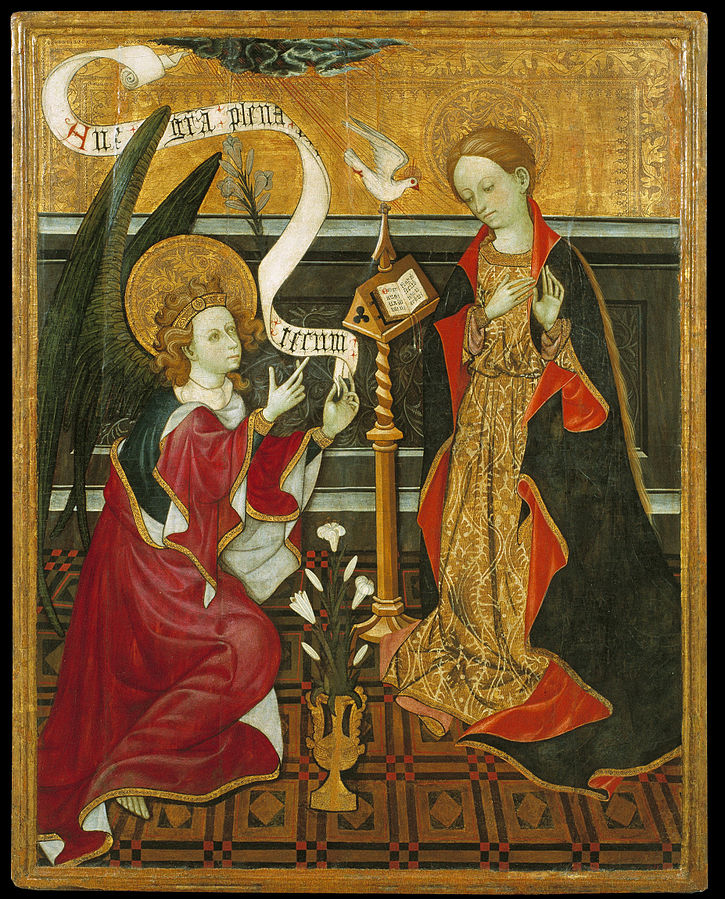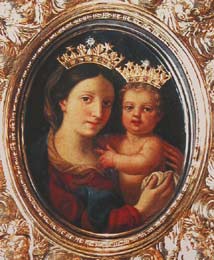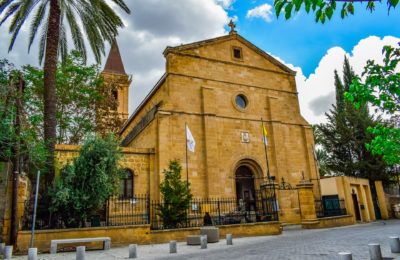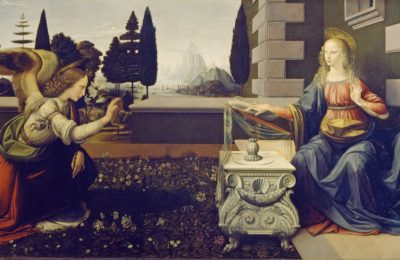“Let us run to Mary, and, as her little children, cast ourselves into her arms with a perfect confidence.”
~Saint Francis de Sales, Bishop and Doctor of the Church
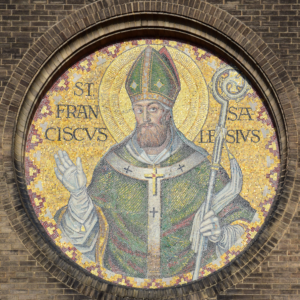
~mosaic of St. Francis de Sales at Saint Francis de Sales Oratory, St. Louis, Missouri
Tomorrow, the Roman Catholic Church commemorates possibly the most beautiful moment in the history of the world, the Annunciation; or, as the day of the Annunciation is known, Lady Day. Dom Prosper Gueranger (b. 1805- d. 1875) wrote a beautiful piece for this day, and I am posting it in its entirety. Dom Prosper wrote:
This is a great day, not only to man, but even to God Himself, for it is the anniversary of the most solemn event that time has ever witnessed. On this day the Divine Word by which the Father created the world was made flesh in the womb of a virgin and dwelt among us (John i. 14). We must spend it in joy. While we adore the Son of God who humbled Himself by thus becoming Man let us give thanks to the Father who so loved the world as to give His Only Begotten Son (John iii. 16). Let us give thanks to the Holy Ghost whose almighty power achieves the great mystery. We are in the very midst of Lent and yet the ineffable joys of Christmas are upon us: our Emmanuel is conceived on this day, and nine months hence will be born in Bethlehem, and the Angels will invite us to come and honour the sweet babe.
During Septuagesima Week we meditated on the fall of our First Parents and the triple sentence pronounced by God against the serpent, the woman and Adam. Our hearts were filled with fear as we reflected on the divine malediction, the effects of which are to be felt by all generations, even to the end of the world. But in the midst of the anathemas then pronounced against us, there was a promise made us by our God. It was a promise of salvation, and it kindled hope within us. In pronouncing sentence against the serpent, God said that his head should one day be crushed, and that, too, by a woman.
The time has come for the fulfilment of this promise. The world has been in expectation for four thousand years, and the hope of its deliverance has been kept up in spite of all its crimes. During this time God has made use of miracles, prophecies and types as a renewal of the engagement He has entered into with mankind. The blood of the Messiah has passed from Adam to Noah; from Sem to Abraham, Isaac and Jacob; from David and Solomon to Joachim. And now it flows in the veins of Mary, Joachim’s daughter. Mary is the woman by whom is to be taken from our race the curse that lies upon it. God has decreed that she should be Immaculate, and thereby has set an irreconcilable enmity between her and the serpent. She, a daughter of Eve, is to repair all the injury done by her mother’s fall. She is to raise up her sex from the degradation into which it has been cast. She is to co-operate, directly and really, in the victory which the Son of God is about to gain over His and our enemy.
A tradition which has come down from the Apostolic Ages tells us that the great mystery of the Incarnation was achieved on the twenty-fifth day of March. It was at the hour of midnight when the most Holy Virgin was alone and absorbed in prayer that the Archangel Gabriel appeared before her and asked her, in the name of the Blessed Trinity, to consent to become the Mother of God. Let us assist, in spirit, at this wonderful interview between the Angel and the Virgin. And at the same time let us think of that other interview which took place between Eve and the serpent. A holy Bishop and Martyr of the second century, Saint Irenaeus — who had received the tradition from the very disciples of the Apostles — shows us that Nazareth is the counterpart of Eden. In the garden of delights there is a virgin and an angel. And a conversation takes place between them. At Nazareth, a virgin is also spoken to by an angel, and she answers him. But the angel of the earthly Paradise is a spirit of darkness, and he of Nazareth is a spirit of light. In both instances it is the Angel that has the first word. “Why,” said the serpent to Eve, “why has God commanded you that you should not eat of every tree of paradise?” His question implies impatience and a solicitation to evil. He has contempt for the frail creature to whom he addresses it, but he hates the image of God which is upon her.
See, on the other hand, the Angel of light. See with what composure and peacefulness he approaches the Virgin of Nazareth, the new Eve. And how respectfully he bows himself down before her: “Hail, full of grace! The Lord is with thee! Blessed art thou among women!” Such language is evidently of Heaven: none but an Angel could speak thus to Mary.
Eve imprudently listens to the tempter’s words. She answers him. She enters into conversation with one that dares to ask her to question the justice of God’s commands. Her curiosity urges her on. She has no mistrust in the serpent. This leads her to mistrust her Creator.
Mary hears what Gabriel has spoken to her, but this Most Prudent Virgin is silent. She is surprised at the praise given her by the Angel. The purest and humblest of virgins has a dread of flattery, and the heavenly Messenger can get no reply from her until he has fully explained his mission by these words: “Fear not, Mary, for you have found grace with God. Behold, you will conceive in your womb, and will bring forth a son: and you will call his name Jesus. He will be great, and will be called the Son of the Most High, and the Lord God will give him the throne of David his father: and he will reign in the house of Jacob forever, and of his kingdom there will be no end.” What magnificent promises are these, which are made to her in the name of God! What higher glory could she, a daughter of Judah, desire? knowing, too, as she does, that the fortunate Mother of the Messiah is to be the object of the greatest veneration! And yet, it tempts her not. She has forever consecrated her virginity to God in order that she may be the more closely united to Him by love. The grandest possible privilege, if it is to be on the condition of her violating this sacred vow, would be less than nothing in her estimation. She thus answers the Angel: “How will this be done because I know not man?”
The first Eve evinces no such prudence or disinterestedness. No sooner has the wicked spirit assured her that she may break the commandment of her divine benefactor and not die, that the fruit of her disobedience will be a wonderful knowledge which will put her on an equality with God Himself, than she immediately yields. She is conquered. Her self-love has made her at once forget both duty and gratitude: she is delighted at the thought of being freed from the two-fold tie which binds her to her Creator.
Such is the woman that caused our perdition! But how different is She that was to save us! The former cares not for her posterity. She looks but to her own interests. The latter forgets herself to think only of her God, and of the claims He has to her service. The Angel, charmed with this sublime fidelity, thus answers the question put to him by Mary and reveals to her the designs of God: “The Holy Ghost will come upon you, and the power of the Most High will overshadow you. And therefore also the Holy which will be born of you will be called the Son of God. And behold your cousin Elizabeth, she also has conceived a son in her old age. And this is the sixth month with her that is called barren, because no word will be impossible with God.” This said, he is silent and reverently awaits the answer of the Virgin of Nazareth.
Let us look once more at the Virgin of Eden. Scarcely has the wicked spirit finished speaking than Eve casts a longing look at the forbidden fruit: she is impatient to enjoy the independence it is to bring her. She rashly stretches forth her hand. She plucks the fruit. She eats it and death takes possession of her: death of the soul, for sin extinguishes the light of life, and death of the body, which, being separated from the source of immortality, becomes an object of shame and horror, and finally crumbles into dust.
But let us turn away our eyes from this sad spectacle and fix them on Nazareth. Mary has heard the Angel’s explanation of the mystery. The will of Heaven is made known to her and how grand an honour it is to bring upon her! She, the humble maid of Nazareth, is to have the ineffable happiness of becoming the Mother of God, and yet the treasure of her virginity is to be left to her! Mary bows down before this sovereign will and says to the heavenly Messenger: “Behold the handmaid of the Lord: be it done to me according to your word.”
Thus, as the great Saint Irenaeus and so many of the Holy Fathers remark, the obedience of the second Eve repaired the disobedience of the first: for no sooner does the Virgin of Nazareth speak her fiat — be it done — than the Eternal Son of God (who, according to the divine decree, awaited this word) is present by the operation of the Holy Ghost in the chaste womb of Mary, and there He begins his human life. A Virgin is a Mother, and Mother of God. And it is this virgin’s consenting to the divine will that has made her conceive by the power of the Holy Ghost.
This sublime Mystery puts between the Eternal Word and a mere woman the relations of Son and Mother. It gives to the Almighty God a means by which He may, in a manner worthy of His Majesty, triumph over Satan who had hitherto seemed to have prevailed against the divine plan. Never was there a more entire or humiliating defeat than that which was this day gained over Satan. The frail creature, over whom he had so easily triumphed at the beginning of the world, now rises and crushes his proud head. Eve conquers in Mary. God would not choose man for the instrument of his vengeance. The humiliation of Satan would not have been great enough. And therefore she who was the first prey of Hell, the first victim of the tempter, is selected as the one that is to give battle to the enemy. The result of so glorious a triumph is that Mary is to be superior not only to the rebel angels, but to the whole human race, yes, to all the Angels of Heaven. Seated on her exalted throne, she, the Mother of God, is to be the Queen of all creation. Satan, in the depths of the abyss, will eternally bewail his having dared to direct his first attack against the woman, for God has now so gloriously avenged her. And in Heaven the very Cherubim and Seraphim reverently look up to Mary and deem themselves honoured when she smiles upon them, or employs them in the execution of any of her wishes, for she is the Mother of their God.
Therefore is it that we, the children of Adam who have been snatched by Mary’s obedience from the power of Hell, solemnise this day of the Annunciation. Well may we say of Mary those words of Deborah when she sang her song of victory over the enemies of God’s people: “The valiant men ceased, and rested in Israel, until Deborah arose, a Mother arose in Israel. The Lord chose new wars, and He Himself overthrew the gates of the enemies” (Judges v. 7, 8). Let us also refer to the holy Mother of Jesus these words of Judith who by her victory over the enemy was another type of Mary: “Praise the Lord our God, who has not forsaken them that hope in Him. And by me, His handmaid, He has fulfilled His mercy, which He promised to the house of Israel; and He has killed the enemy of His people by my hand this night… The Almighty Lord has struck him, and has delivered him into the hands of a woman, and has slain him” (Judith xiii. 17, 18; xvi. 7).
Lesson – Isaias vii.
In those days the Lord spoke to Achaz, saying: “Ask a sign of the Lord your God, either to the depth of Hell, or to the height above.” And Achaz said: “I will not ask, and I will not tempt the Lord.” And he (Isaias) said: “Hear, therefore, O house of David: Is it a small thing for you to to be grievous to men, that you are grievous to my God also? Therefore the Lord Himself gives you a sign. Behold: “a Virgin will conceive and bear a son, and his name will be called Emmanuel. He will eat butter and honey, that he may know to refuse the evil, and to choose the good.”
Thanks be to God.
Dom Prosper Guéranger:
The Prophet is speaking to a wicked king who refused to accept a miraculous proof of God’s merciful protection over Jerusalem. And he makes this an opportunity for announcing to Judah the great portent which we are celebrating today: “A Virgin will conceive and bear a son.” And when was it that God fulfilled the prophecy? It was in an age when mankind seemed to have reached the highest pitch of wickedness, and when idolatry and immorality reigned throughout the whole world. The fullness of time came, and the tradition which had found its way into every country, that a Virgin should bring forth a Son, was exciting much interest. This is the day on which the mystery was accomplished. Let us adore the power of God and the fidelity with which He fulfils His promises. The author of the laws of nature suspends them. He acts independently of them: Virginity and Maternity are united in one and the same creature, for the child that is to be born is God. A Virgin could not bring forth other than God Himself: the Son of Mary is therefore called Euunanuel, that is, God with us.
Let us adore this God, the Creator of all things visible and invisible, who thus humbles Himself. Henceforth, He will have every tongue confess not only His Divinity, but also His Human Nature, which He has assumed in order that He might redeem us. From this day forward He is truly the Son of Man. He will remain nine months in His Mother’s womb, as other children. Like them, He will, after His birth, be fed on milk and honey. He will sanctify all stages of human life, from infancy to perfect manhood, for He is the New Man who has come down from Heaven that he might restore the Old. Without losing anything of His Divinity, He shares in our weak finite being that He may make us partakers of the divine nature (1 Peter i. 4).
Gospel – Luke i.
At that time the Angel Gabriel was sent from God into a city of Galilee called Nazareth, to a virgin espoused to a man whose name was Joseph, of the house of David. And the virgin’s name was Mary. And the Angel being come in, said to her: “Hail, Mary, full of grace, the Lord is with thee: blessed art thou among women.” Who having heard, was troubled at his saying, and thought with herself what manner of salutation this should be. And the Angel said to her: “Fear not, Mary, for you have found grace with God. Behold you will conceive in your womb, and will bring forth a son, and you will call his name Jesus. He will be great, and will be called the Son of the Most High, and the Lord God will give him the throne of David his father: and he will reign in the house of Jacob forever, and of his kingdom there will be no end.” And Mary said to the Angel: “How will this be done, because I know not man?” And the Angel answering, said to her: “The Holy Ghost will come upon you, and the power of the Most High will overshadow you. And therefore also the Holy which will be born of you will be called the Son of God. And behold your cousin Elizabeth she also has conceived a son in her old age, and this is the sixth month with her that is called barren: because no word will be impossible with God.” And Mary said: “Behold the handmaid of the Lord, be it done to me according to your word.”
Praise be to you, O Christ.
Dom Prosper Guéranger:
By these last words of yours, Mary, our happiness is secured. You consent to the desire of Heaven, and your consent brings us our Saviour. Virgin-Mother! Blessed among women! We unite our thanks with the homage that is paid you by the Angels. By you is our ruin repaired. In you is our nature restored, for you have wrought the victory of man over Satan! Saint Bernard, in one of his Homilies on this Gospel thus speaks: “Rejoice, our father Adam! But you, mother Eve, still more rejoice! You were our Parents, but you were also our destroyers. And what is worse, you had wrought our destruction before you gave us birth. Both of you must be consoled in such a Daughter as this: but you, Eve, who was the first cause of our misfortune, and whose humiliation has descended upon all women, you have a special reason to rejoice in Mary. For the time is now come when the humiliation is taken away, neither can man any longer complain against the woman as of old when he foolishly sought to excuse himself, and cruelly put all the blame on her, saying: “The woman whom you gave me, gave me of the Tree, and I did eat. Go, Eve, to Mary. Go, Mother, to your Daughter. Let your Daughter take your part, and free you from your disgrace, and reconcile you to her father: for, if man fell by a woman, he is raised up by a woman. What is this you say, Adam? The woman whom you gave me, gave me of the Tree, and I did eat? These are wicked words. Far from effacing your fault, they aggravate it. But divine Wisdom conquered your wickedness by finding in the treasury of His own inexhaustible mercy a motive for pardon which He had in vain sought to elicit by questioning you. In place of the woman of whom you complain He gives you another: Eve was foolish, Mary is wise. Eve was proud, Mary is humble. Eve gave you of the tree of death, Mary will give you of the Tree of life. Eve offered you a bitter and poisoned fruit, Mary will give you the sweet Fruit she herself is to bring forth, the Fruit of everlasting life. Change, then, your wicked excuse into an act of thanksgiving, and say: The woman whom you have given me, Lord, has given me of the Tree of Life, and I have eaten thereof. And it is sweeter than honey to my mouth, for by it you have given me life.” (source)
That is beautiful.
Yes, it is as Dom Prosper said: “By these last words of yours, Mary, our happiness is secured. You consent to the desire of Heaven, and your consent brings us our Saviour. Virgin-Mother! Blessed among women! We unite our thanks with the homage that is paid you by the Angels. By you is our ruin repaired. In you is our nature restored, for you have wrought the victory of man over Satan!” (DPG)
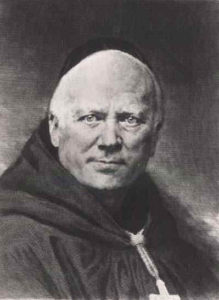
Dom Prosper Gueranger, circa 1874.
So, today, let us re-commend ourselves into the care of Our Lady as St. Francis de Sales advises: “Let us run to Mary, and, as her little children, cast ourselves into her arms with a perfect confidence.”
May you have a good Lady Day.
~SCF
~Image (top of post): The Annunciation, source.
~Dom Prosper image: source.
~St. Francis de Sales image, source.
~Customs associated with Lady Day.
~Tomorrow (March 25th) is also Little Christmas.

